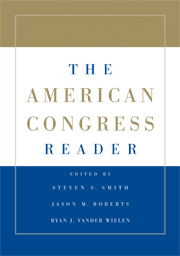Book contents
- Frontmatter
- Contents
- THE AMERICAN CONGRESS READER
- PART I THE AMERICAN CONGRESS: MODERN TRENDS
- PART II REPRESENTATION AND LAWMAKING IN CONGRESS: THE CONSTITUTIONAL AND HISTORICAL CONTEXT
- PART III CONGRESSIONAL ELECTIONS AND POLICY ALIGNMENTS
- PART IV MEMBERS, GOALS, RESOURCES, AND STRATEGIES
- PART V PARTIES AND LEADERS
- PART VI THE STANDING COMMITTEES
- PART VII THE RULES OF THE LEGISLATIVE GAME
- PART VIII THE FLOOR AND VOTING
- 25 Greasing the Wheels
- 26 Models of Legislative Voting
- 27 Pivotal Politics
- PART IX CONGRESS AND THE PRESIDENT
- PART X CONGRESS AND THE COURTS
- PART XI CONGRESS, LOBBYISTS, AND INTEREST GROUPS
- PART XII CONGRESS AND BUDGET POLITICS
- PART XIII FURTHER READINGS ON CONGRESSIONAL POLITICS
25 - Greasing the Wheels
Using Pork Barrel Projects to Build Majority Coalitions in Congress – Excerpt
Published online by Cambridge University Press: 05 June 2012
- Frontmatter
- Contents
- THE AMERICAN CONGRESS READER
- PART I THE AMERICAN CONGRESS: MODERN TRENDS
- PART II REPRESENTATION AND LAWMAKING IN CONGRESS: THE CONSTITUTIONAL AND HISTORICAL CONTEXT
- PART III CONGRESSIONAL ELECTIONS AND POLICY ALIGNMENTS
- PART IV MEMBERS, GOALS, RESOURCES, AND STRATEGIES
- PART V PARTIES AND LEADERS
- PART VI THE STANDING COMMITTEES
- PART VII THE RULES OF THE LEGISLATIVE GAME
- PART VIII THE FLOOR AND VOTING
- 25 Greasing the Wheels
- 26 Models of Legislative Voting
- 27 Pivotal Politics
- PART IX CONGRESS AND THE PRESIDENT
- PART X CONGRESS AND THE COURTS
- PART XI CONGRESS, LOBBYISTS, AND INTEREST GROUPS
- PART XII CONGRESS AND BUDGET POLITICS
- PART XIII FURTHER READINGS ON CONGRESSIONAL POLITICS
Summary
In this excerpt, Evans considers the nature of coalition building for individualistic or “pork barrel” projects in Congress. She argues that party leaders use pork projects to gain votes on other general interest legislation.
[My] argument is that one important strategy by which policy coalition leaders create legislative majorities for controversial general interest legislation is to buy legislators' votes, one by one, favor by favor. Doing so not only helps leaders to unite their party, but it also can draw members of the other party away from their own caucus. Where attainment of a secure majority on the merits seems doubtful, distributive benefits provide the extra margin of support to compensate for pressures that otherwise might persuade members not to vote for such a bill. This strategy is particularly interesting for its use of the sort of policy that is most reviled by observers of Congress – pork barrel policy – to pass the type that is most admired – general interest policy.
Before proceeding to a discussion of the process of acquiring votes with distributive benefits, it is worthwhile to elaborate on the definition of general interest legislation. I define such legislation as broad-based measures that affect the whole nation or a large segment thereof. This definition of general interest legislation is somewhat similar to Douglas Arnold's definition of general benefits. Arnold requires that in order to be general in their impact, policies must “fall uniformly on members of society.”
- Type
- Chapter
- Information
- The American Congress Reader , pp. 279 - 291Publisher: Cambridge University PressPrint publication year: 2008

